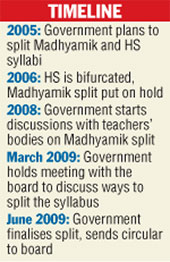 |
The state government’s decision to split the Madhyamik syllabus was not ratified in the secondary board’s meeting on Wednesday in the face of opposition from the CPM-controlled teachers’ body.
The executive committee of the West Bengal Board of Secondary Education on Wednesday was supposed to pass the proposal to hold Madhyamik only on the Class X syllabus, said sources. The issue, however, was hardly discussed.
“We oppose the bifurcation of the Madhyamik syllabus. Workshops and interactive sessions organised by our association have revealed that the quality of Madhyamik education will suffer if the syllabus is split,” said Arup Roy, the general secretary of the All Bengal Teachers’ Association (ABTA) and a member of the panel.
Last month, after the government finalised its decision to split the Madhyamik syllabus — which currently covers the syllabi of classes IX and X — the state school education department had issued a circular to the board asking it to prepare for the split, preferably from 2010.
Since the board is an autonomous body, it cannot implement the split only on the basis of a directive of the government directive.
The order has to be ratified by the board’s executive committee.
“The bifurcation issue was placed before the executive committee meeting but it could not be discussed in detail because a number of members felt that the government should consider the ABTA’s stand,” said a committee member on Wednesday.
Partha Ray, the board secretary, however, said the issue was not discussed in detail in the meeting as it was not on the agenda.
The ICSE and CBSE boards have been holding the board exam only on the Class X syllabus for years.
The state government’s bifurcation move is aimed at establishing parity between Madhyamik and other boards and reducing stress on students.
The state government split the HS syllabus three years ago. The ABTA had objected to the step.
“The standard of education in HS schools, particularly in Class XI, is falling because of the bifurcation. We cannot allow such deterioration at the Madhyamik level,” said an ABTA member.










